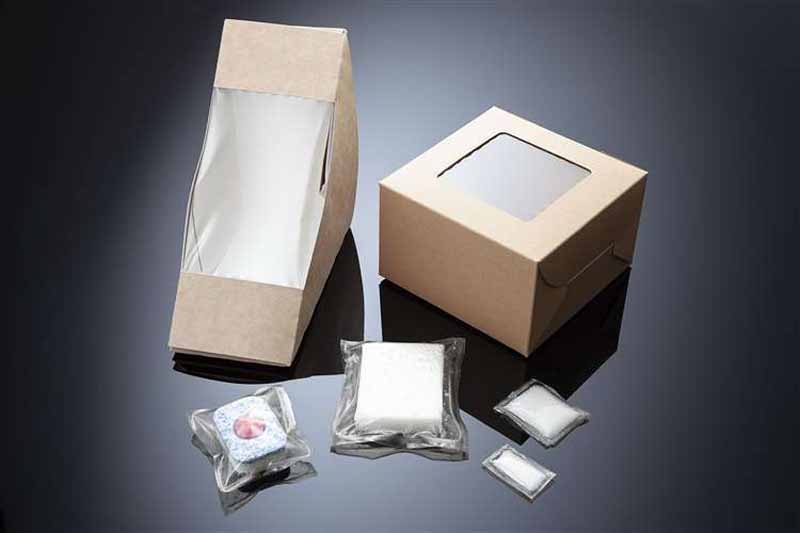
A variety of materials are being developed to replace plastics in sustainable packaging including vegan spider silk.
Plastic is problematic, particularly single-use plastics. Their production creates pollutants, they take hundreds of years to break down, a very small portion of the plastic produced around the world is actually recycled, and they make up 70% of all marine trash.
So, many companies have been moving away from single use plastics – or any plastics at all – towards a variety of packaging options for retail spa products and food and beverage.
The best-known alternative to plastic is paper, which many (most?) people believe is greener, but which others argue actually isn’t much better for a variety of reasons. For example, while paper biodegrades faster than plastic under ideal conditions, a landfill (which is where both of these items will end up if not recycled) is not an ideal condition, as they are usually too densely packed for biodegradation to occur. Paper is also said to take significantly more energy to manufacture than plastic and create much more air and water pollution than plastic. Plus, paper comes from trees, which are a finite resource.
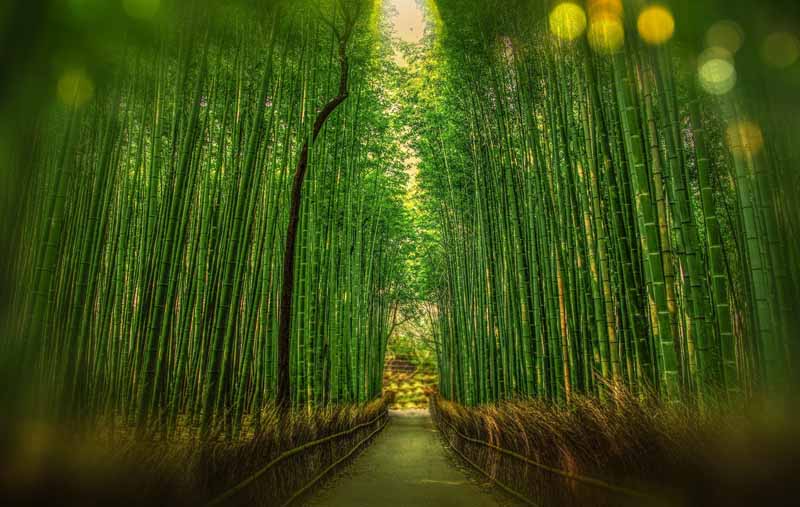
Bamboo grows abundantly but its use may displace wildlife
Paper isn’t the only alternative that some say creates new problems even while solving others.
One of the fastest growing plants on Earth, bamboo has become popular for use in household and personal care products and packaging. Touted as an eco-friendly alternative to plastic, metal, and paper, bamboo packaging is a durable and renewable option that breaks down within two to six months. Bamboo requires no pesticides or irrigation in its cultivation, releases 35% more oxygen into the atmosphere than trees, and has a greater tensile strength than steel.
Unfortunately, however, due to bamboo’s increasing popularity, large areas of land are being cleared to be planted with it and this leads to the displacement of wildlife, including vulnerable wildlife like pandas, and a decrease in the biodiversity of existing ecosystems. Furthermore, according to Eco & Beyond, the only commercial scale production of bamboo currently takes place in China, and the distance a product has to travel for sale in other places around the world creates a carbon footprint that can somewhat negate its green credentials. Nothing is perfect.
Refillable containers are a great idea
Using refillable containers is another solution, be they metal or even plastic. Not only is this a sustainable option, it offers the opportunity for companies to brand containers for customers to take home and reuse again and again. Among the cosmetics companies that have moved towards refillable containers are Dove, Chanel, and Khiel’s.
Innovative packaging ideas
Innovative and experimental companies are also experimenting with new and exciting materials to replace plastic. Many are in the fledgling stage, and who knows which, if any, will catch on in future and eventually become as ubiquitous as plastic is today.
While we can’t know the answer to that, it does look like the status quo is undergoing a shift that will likely be permanent. Something will replace plastic as we know it today, even if we don’t yet know what.
Here are four materials that are in various stages of being developed for use as eco-friendly packaging alternatives to plastic.
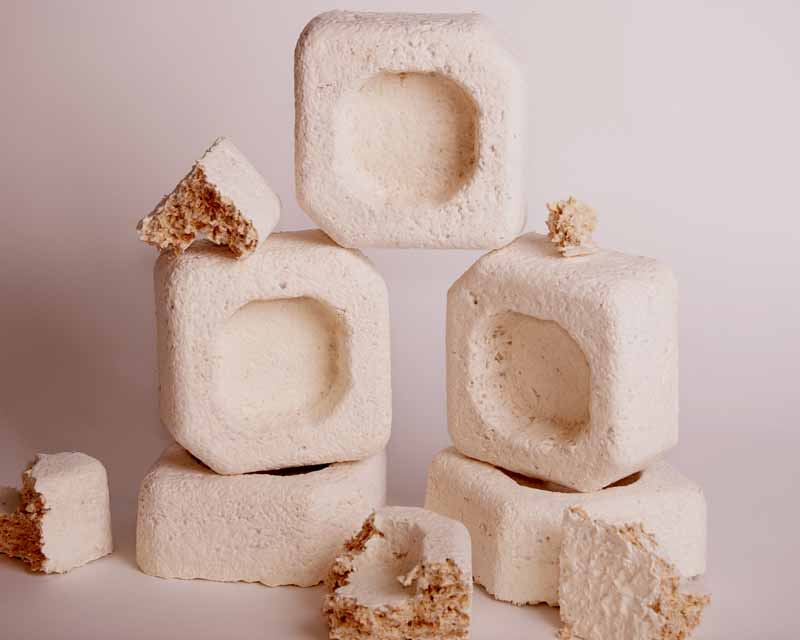
Mushrooms
Mushroom packaging is created from agricultural residue by mixing mycelia (fungus sprouts), with seedlings or other residues. The network of wire-like cells acts as a natural adhesive and grows without the need for light, water or chemical additives. When desired, growth is stopped by a drying and heat treatment process. The result is a fully natural composite material similar to Styrofoam. Mushroom packaging consists of 100 percent biodegradable and renewable material. A company called Ecovative pioneered the science of using mycelium to grow fully formed structures used in products to replace Styrofoam and plastics.
Mushroom packaging offers an alternative to disposable plastic packaging common to the beauty industry.

Vegan spider silk
Researchers at the University of Cambridge accidentally discovered that plant-based “vegan spider silk” could replace pollutants found in everyday packaging materials while researching something else. As it doesn’t come from spiders, the synthetic polymer is not technically spider silk, which is one of the strongest naturally occurring materials on Earth, but mimics its composition.
Popular Mechanics reported that the new material is similar to plastic, is compostable, and has the potential for use in various applications and that the hope is that it will be an effective, environmentally friendly alternative to the harmful microplastics and single-use plastics found in everyday products.
The material will be developed commercially by a University of Cambridge affiliated company called Xampla, which is introducing a range of capsules and sachets, including a high performance fragrance microcapsule for the home and personal care industries.
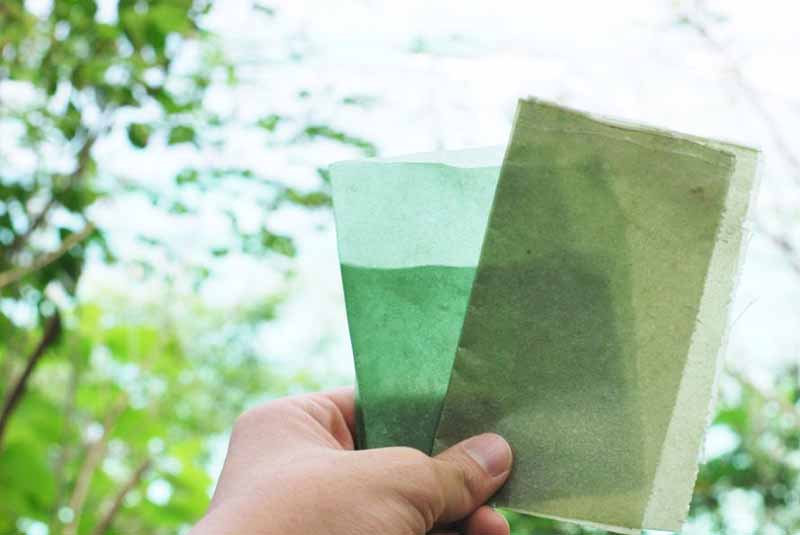
Seaweed
Seaweed packaging is made of a natural polymer derived from seaweed, an abundant and readily accessible resource, and may take the form of a flexible membrane or disposable bioplastic film. It’s biodegradable, dissolvable, and edible, making it a promising alternative to plastic packaging for food and cosmetics like gels, masks, and liquids.
According to a report, naturally occurring antioxidant properties in seaweed can minimize lipid oxidation and may thereby increase the shelf life and nutritional value of food “as well as reduce free radicals which might have a carcinogenic, mutagenic or cytotoxic effect.” Some seaweeds have also proven to inhibit bacteria growth, meaning it could possibly be used in antimicrobial packaging.
Indonesia-based, socially responsible enterprise Evoware is one company creating seaweed packaging with missions to create innovative solutions to combat waste and carbon emissions, and to increase the livelihood of Indonesia’s seaweed farmers.
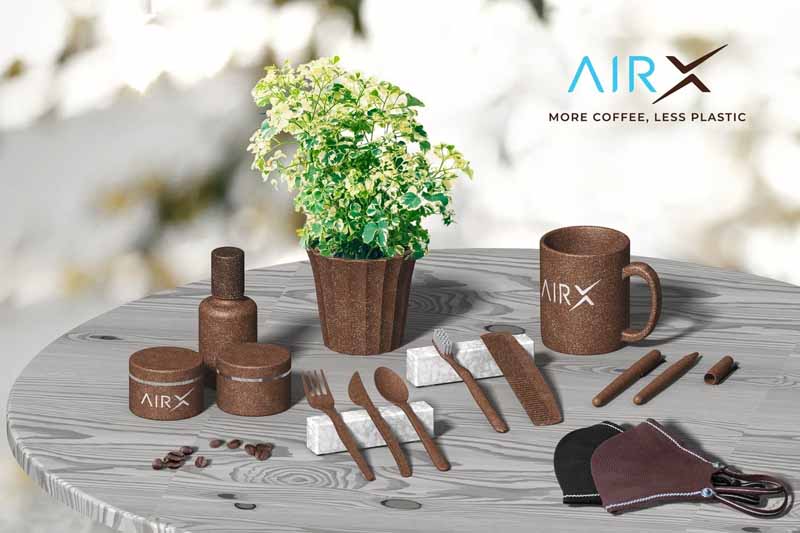
Coffee
The world sends more than six million tons of coffee grounds to landfills each year, according to the World Economic Forum, and the by-products of this waste – tannins, caffeine, and chlorogenic acid – can be lethal to every organism on the planet in high doses.
So, it’s good news that researchers have identified cellulose nanofibers extracted from spent coffee grounds as a potential material for use in biodegradable plastics. Demand for these nanofibers is increasing worldwide, “as industries realize their potential as a more environmentally sound and sustainable way to produce plastics.” The researchers’ goal was to establish a sustainable recycling system for the coffee industry.
Meanwhile, Vietnamese green product manufacturer AirXcoffee has developed a bio-composite, recyclable, light material using locally sourced coffee grounds to replace single-use plastic and is currently making coffee cups and personal care products, among other things.
AirXcoffee partners with local coffee shops in Vietnam to supply the grounds, which are dried and then blended with cellulose, starch, waxes, wood, natural resins and oils.
Spa Executive is published by Book4Time, the leader in guest management, revenue and mobile solutions for the most exclusive spas, hotels, and resorts around the globe. Learn more at book4time.com



